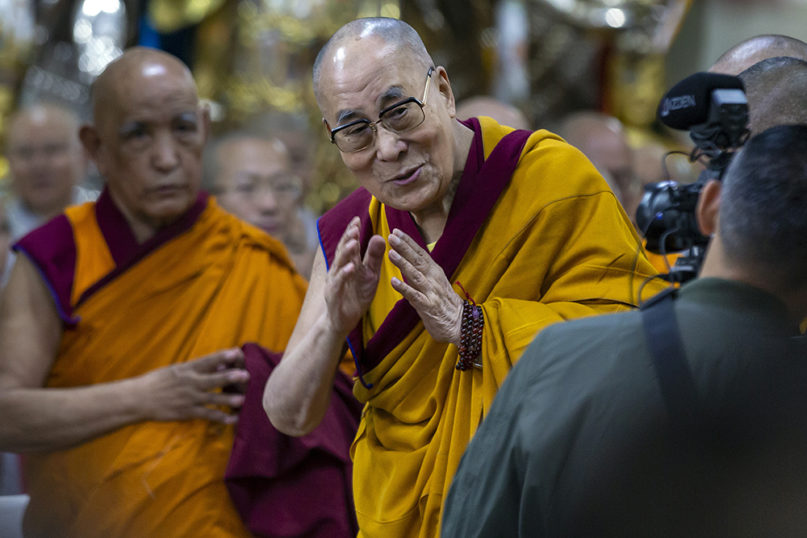(RNS) — Imagine a Roman Catholic pope proclaiming that the College of Cardinals is a flawed institution ripe for abolishment. Not in some medieval power play, mind you, but a contemporary Summus Pontifex Ecclesiae Universalis saying it’s time to chuck a cornerstone of church tradition.
Little chance, you’re probably thinking, and you’re no doubt right.
Yet that in effect is what the Dalai Lama did recently regarding a key aspect of his own tradition, Tibetan Buddhism. In late October, the Dalai Lama told a group of visiting students in Dharamsala, India, that the “custom of recognizing reincarnate lamas may have had its day.”
“He wondered what place this institution has in a democratic society,” according to his official web site, dalailama.com.
In Tibetan Buddhism, reincarnated lamas, or tulkus, once asserted great economic and political power over the general population. Now the Dalai Lama has questioned the position’s value, given how dramatically Tibetan culture has changed under Beijing’s authoritarian and anti-religious rule.
“Institutions need to be owned by the people, not by an individual,” said the Dalai Lama, according to The Times of India.
The College of Cardinals is not a perfect analogy, since, unlike the Catholic Church, Buddhism lacks a single authority. In fact, the Dalai Lama does not even speak for all of Tibetan Buddhism, which has several internal divisions.
Still, it was an extraordinary statement by the Dalai Lama: That a centuries-old religious tradition, one overwhelmingly accepted by followers as inviolate truth, “should end, or at least change with the changing times,” The Times of India also reported.
The stated logic of the move was to give a tradition left over from feudal times a democratic update. But it may be a political strategem as well. The Dalai Lama himself is considered the 14th in a traditional line of reincarnated bodhisattvas, so-called realized beings said to retain an earthly existence only to help others evolve spiritually.
Given that Tibet’s overlords in Beijing have demanded a final say over who succeeds him, the Dalai Lama, now 84, may have questioned the tulku tradition, just as he’s already cast doubt on the future of the Dalai Lama lineage, to undercut Chinese threats.
Whatever his motivation, how different his move was from religious leaders who cling to entrenched modes of thinking, citing tradition as its own unquestionable authority.
There are precedents for this kind of change in religious hierarchy in the face of political forces.
After the Roman destruction of the second Jerusalem Temple, until then the center of Jewish ritual practice, rabbinic Judaism, centered in the synagogue and home, replaced the hereditary Temple priesthood that lived off of the daily animal sacrifices it controlled. The Dalai Lama’s comments on the tulku tradition may be viewed in this light.
Change, of course, is built into Buddhist thought. The certainty of constant and unending worldly change is ingrained in Buddhist scripture and is known in Sanskrit as sunyata, generally translated as “emptiness.”
Emptiness means, among other things, that concepts, even seemingly sacrosanct traditional beliefs, have no intrinsic reality. As such, seemingly inviolable beliefs are simply mental constructs devoid of unshakable, ultimate truth.
This makes it theologically easier for someone like the Dalai Lama to short-circuit a long-held belief than it is for, say, a pope, who is rooted in a tradition believed to have been revealed by the ultimate authority, the monotheistic Abrahamic deity Westerners generally think of as God.
To be clear, I’m not suggesting faiths jettison all their traditions.
Many — including such obvious examples as prohibitions against wanton killing and theft, plus those that foster sincere cooperation and compassion among individuals — are certainly worth keeping, and passing on.
Nor do I think it would be easy to convince individuals, including liberal Westerners, to surrender inherited traditions they may still, consciously or unconsciously, rely upon for direction and meaning. Rethinking all traditions solely to foster revolutionary progressive change may sound more desirable than it might actually be.
For me, the psychological and spiritual warmth of some traditional communal rituals and the link they provide to my personal history make them more than just worthwhile. They also help me connect to the unknowable mystery that the liberal Protestant theologian Paul Tillich referred to as “the ground of being.”
But consider how reevaluating some beliefs long held unimpeachable might be helpful, religiously and in the secular realm.
Take countering the climate crisis.
The Abrahamic tradition has promulgated the belief that a favored humanity has domain over the Earth and all its life forms. That’s interpreted in the global secular marketplace to mean that human progress, above all, is measured by unbroken material advancement.
That’s a dangerous belief to cling to when humanity is approaching an environmental breaking point that threatens to unleash a tsunami of suffering, the likes of which we cannot fully imagine and will be unable to avoid, for all our material wealth.
Wouldn’t it be helpful to rethink what was but perhaps should no longer be? As the Dalai Lama might put it, what good are habitual mental constructs if they do not benefit the people who must cope with them?
(Ira Rifkin, a former Washington, D.C.-based national correspondent for Religion News Service, is the author of “Spiritual Perspectives on Globalization.” The views expressed in this commentary do not necessarily reflect those of Religion News Service.)





